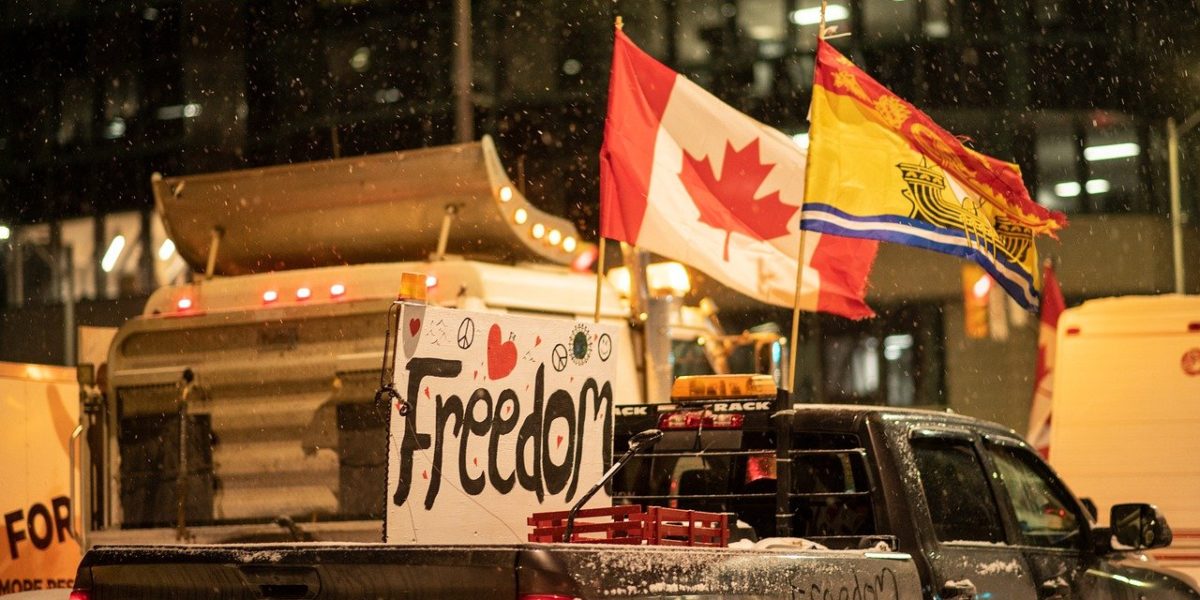One year ago, the world watched as the capital of Canada faced an occupation of its own on Parliament Hill.
The culmination of COVID-19 conspiracy theories and economic unrest related to the pandemic, swaths of anti-vaccine demonstrators occupied downtown Ottawa for three weeks.
While participants and supportive government officials play down the ramifications of the occupation, reports show it cost the public an estimated $7 million, along with $55 million in spending by Ottawa police.
Now, the first part of a report by the Ottawa Peoples’ Commission (OPC) is arguing people who live and work in Ottawa were faced with a barrage of “widespread human rights abuse.”
The abuse took many forms, from sexual harassment and intimidation to acts of racism, misogyny, antisemitism, Islamophobia, homophobia, transphobia and more.
All of this in the name of freedom.
Occupation made neighbourhoods unnavigable
The OPC convened last summer to determine how to define the events of February 2022, while also giving a platform to residents of Ottawa who were impacted by them.
Residents struggled to navigate around the core of the country’s capital due to a swath of 18-wheelers, pick-up trucks and other vehicles blocking streets and grinding the nation’s capital to a halt.
The convoy, made up by an overwhelming majority of white men, was composed of individuals who initially claimed to be opponents of a COVID-19 vaccine mandate for truck drivers travelling between Canada and the United States.
As the occupation continued, the demands by protesters to reject vaccine mandates found its objectives becoming, ironically, less about freedom and more about undemocratically removing the Canadian Prime Minister.
The OPC found that by making many streets “entirely unnavigable,” the occupation resulted in essential public transport relied upon by seniors and people with disabilities being significantly reduced or cancelled altogether.
READ MORE: Emergencies Act was necessary to dislodge bullies in giant vehicles
Rather than feeling supported and protected by local police, the Commission says residents felt “abandoned,” with no enforcement of noise, parking or other public safety bylaws and a failure to intervene or follow-up on threats, acts of racism, and assaults.
“They witnessed friendly exchanges between some members of the police and convoy participants, while their own approaches to police for assistance were often met with indifference or an indication that they could do nothing as they were awaiting orders,” the report reads.
Making matters worse, Ottawa residents say they “found it difficult if not impossible” to find reliable updates from public officials, information crucial to make informed decisions about their safety.
When some human rights matter more than others
Residents were left to their own devices as they dealt with round-the-clock truck horns at harmful decibel levels and noxious diesel fumes from idling truck engines while being exposed to hateful, antisemitic and racist symbols like swastikas and Confederate flags.
In addition, the report shows residents had even more reason to worry: the close proximity between propane tanks and the open fires, barbecues and fireworks associated with the occupation. Not to mention the uncertainty around whether firearms or other weapons were hidden in the trucks.
For the safety of employees, many grocery stores, pharmacies and other essential businesses were forced to close their doors, jeopardizing Ottawa residents’ ability to access food and renew prescriptions.
Describing the decision to use the term “occupation,” human rights lawyer and commissioner Leilani Farha told reporters at a press conference last week residents “felt their city had been invaded and was under siege.”
Farha noted the occupation was a “protracted nature of events” that were “very different from a peaceful or even legitimately provocative demonstration.”
“In Canada, some human rights seem to matter more than other human rights,” Farha said, adding while the right to protest and the right to free expression were upheld, rights to food, housing, health care and peaceful communities were not.
Fellow commissioner Alex Neve, a human rights lawyer and professor of international human rights law at the University of Ottawa, stated “the people of Ottawa were abandoned during the convoy occupation.”
While acknowledging there were possible missteps that allowed the convoy to get “too entrenched too quickly,” Neve argued “abandonment is not the answer to any of that.”
In an interview with rabble.ca, author and human rights advocate Monia Mazigh stated that misinformation was rampant throughout the occupation, creating a lack of understanding for those living outside of Ottawa.
Mazigh, who served as a commissioner on the OPC, added the report concluded that misinformation was rampant throughout the occupation, creating a lack of understanding for those living outside of Ottawa, and a wave of uncertainty for those in the downtown core.
“When we have those rights being taken over, or literally hijacked or occupied, by other people who were claiming they were within their full rights and they were doing this because they wanted answers from the government,” Mazigh said. “But at the same time they were occupying the public spaces of other people, and they were denying them of their freedom as well.”
It’s usually at that time, Mazigh pointed out, that public officials should intervene. It’s their job, after all, to assess situations and declare whether they’re acceptable, legal, or in the case of the occupation – neither.
“…People felt that they were abandoned by their agencies,” Mazigh said. “Those same agencies who were supposed to help them, to support them and to protect them.”
Part two of the report is set to be released in March 2023. The Commission says it will provide further analysis as well as recommendations for action.



